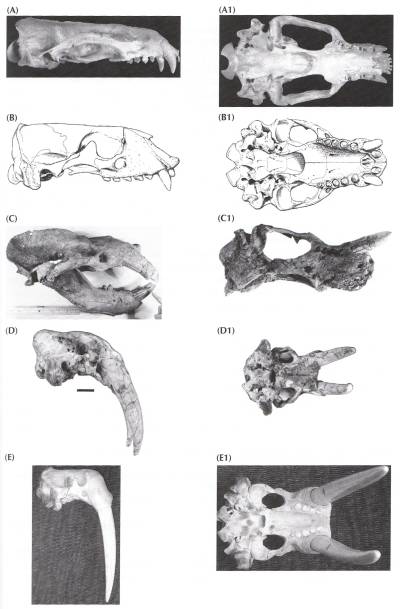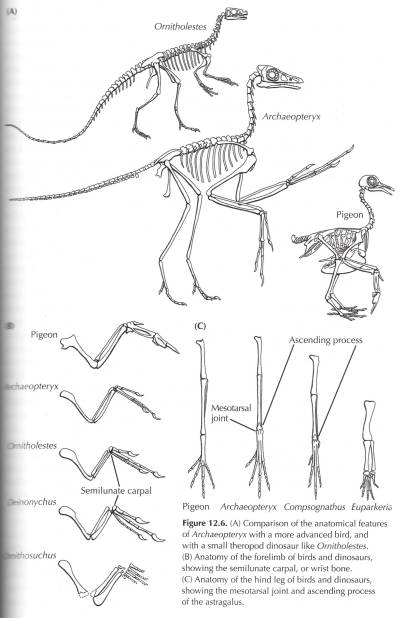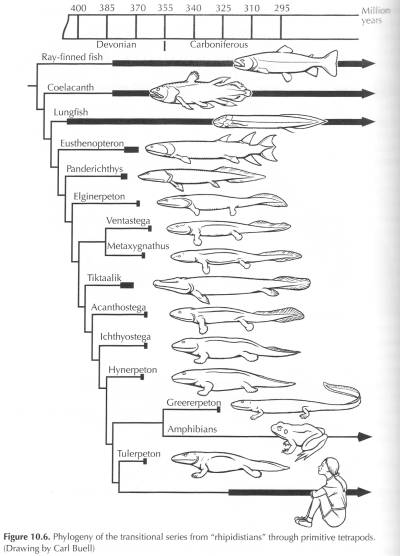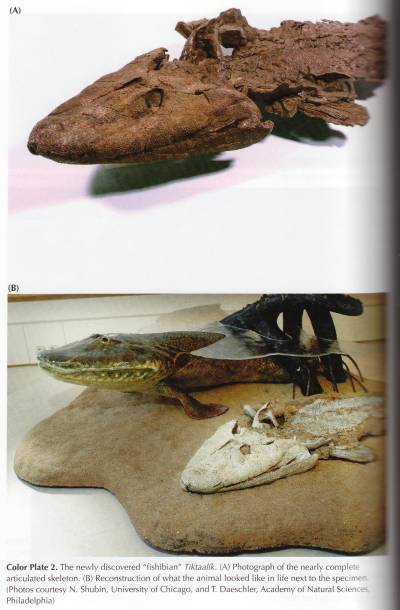Book Review - Evolution: What the Fossils Say and Why It Matters
In honor of Darwin Day, I figured that I'd post an entry related to evolution. Here is my review of Evolution: What the Fossils Say and Why It Matters, written by Donald Prothero, Ph.D. Let me say right at the beginning that the book was very good, and that I recommend it.
The title of the book is a bit misleading, in that it leaves out a major theme that was covered. A good portion in the beginning of the book is spent debunking creationism. Perhaps some readers are aware of Duane Gish's Evolution? the Fossils Say No!, and so notice the play on words and realize that Prothero's book was partly in response to Gish. For others (such as me before I read the book), the allusion isn't so obvious. In any case, Prothero devoted a good bit of space to pointing out the errors in many creationist arguments, including a detailed explanation on how the Grand Canyon was formed through slow geological processes and not through a catastrophic flood, along with the evidence on how we know this.
Also in the beginning of the book, Prothero spent some time explaining science & paleontology, which is what you'd expect for a book intended for a lay audience. His explanation of cladistics was very good.
Finally, on page 145, Prothero started Part II, which presented the evidence and explanations of the history of life on this planet. He started right from the beginning, with a few theories on abiogenesis. Consequently, his first chapter from Part II didn't really have any fossil evidence. As soon as he progressed in time to when organsims developed hard parts that could fossilize, the book finally lived up to its name. He tried to cover a little bit of everything, from pre-cambrian single celled organsims, on up to very recent mammalian evolution. Obviously, with a 400 page book trying to cover that much territory, he couldn't go in depth into any particular topic, but he did give a very good overview. He did tend to cover vertebrates in more detail than any other lineage, but I suppose that's because that's what most readers would be most interested in.
Since the book was about fossil evidence, it included a great deal of photos and drawings of fossils. To give a sense on what was in the book, below is one of my favorite figures, illustrating the transition from seal-like mammals to walruses. (I apologize for the poor quality of these images, especially along the edges, but I wasn't about to ruin the binding on my book just to make it lay flat in the scanner.)

Another good example of the way fossils were presented is the figure below, showing the homology between non-avian dinosaurs and birds.

As would be expected in a book about evolution, there were many cladograms (family trees). They were almost all well illustrated with representative members of each lineage, such as the one below.

The center of the book contained several pages of color plates. These included some nice color photos of fossils, as well as some artistic renderings of what the animals might have looked like in life.

I did have a few reservations. For one, I would have liked to have seen even more photos & illustrations of fossils. In some sections, Prothero mentioned fossils in the text, but had no illustrations to show the reader what they actually looked like. In several sections, Prothero made statements to the effect of, a highly trained paleontologist can see that... I realize that expertise is important, but Prothero came off as a bit condescending in several places. I would have preferred to have seen wording like careful observation shows that...
Overall, it was a very good book, and very informative. I'd already read a few books on evolution prior to this, but they had dealt with much more specific topics, such as the transition from sea to land, or human evolution. This was the first book I'd read that covered such a wide range of transitions, with so many photos and illustrations to support it. If you're already familiar with the creationist arguments, or have a good lay understanding of how evolution works, Part I can be a bit of a slog, although I can see how those chapters would be very informative to people without that background. But once you get to Part II, it's a very informative, fun to read book.

Comments
Jeff,
I found your website through gyroplane links, and am now on the rotary forum. While looking through your website I found your posts regarding christianity and religion.
It was sad to read that you had seemingly tossed the baby with the bathwater.
I am also aware, like you, that christianity is amiss, and probably always will be. Yet I see this more as the problem Christ addressed and not a problem with Biblical teaching; a problem with man. Christianity is paganized if you'll allow that word; but in all honesty, much of this paganization of christianity was instituted as an outreach to pagan peoples until it became christianity today.
As for evolution and science; my problem with it is its dishonesty under accepted scientific methodology as many publications and minds assert that the evidence for evolution says it's true while the journals admit that no evolution idea is really provable today under accepted methodologies, and that they may never be.
I am an enthusiast of all scientific endeavor; but the first thing I learned from life experience is to not enter something with preconceived notions, because you're likely to get it wrong. Proper scientific methodology never sets out to prove something right or true; it sets out to prove something wrong; and it seems much of the scientific community today, and it's adherents, is trying to prove some form of evolution idea, though there are many, correct. Good science is not a democratic process.
I have no problem with evolution ideas. To me they are not counter to my belief in Christ as my redeemer and Creator of all things. And until one is proven that does so, they are not even counter to my understanding of the Bible - the original call to good scientific inquiry.
I have looked at the bones, I have read all there is about biogenetics, and I cannot see where they prove evolution over creation or intelligent design; the evidence supports both; and, logically, I cannot see where some idea of evolution is necessarily in contradiction to creation or intelligent design. Every evidence I see, every prediction, equally supports a Creator, whoever it is.
My soapbox. But think about it. Are you really being honest with yourself? Or are you reacting to something you do not fully understand or disdain.
Somewhere, a disconnect took place in the minds of men. The idea that God is separate from His creation. This, I believe formulated in the minds of unbelieving men as they looked at what they saw as voodooistic spiritism in many so called christians. I do not see deity and Nature as separate, but as one; where Nature is but deity's cosmetic. I see deity as the sum of all thought, science, philosophy and knowledge. Yet within this deity exists Truth, Life and the Path to both. It is God as I worship Him, regardless of the deity about Him. I believe this is the Biblical God - the Powers unified in purpose.
All this is as noble as the separation between the physical laws we all enjoy and the laws which exist sub-atomically within energy. When I think of what I am in scientific understanding, I realize I am not a physical being at all, but a communication of energy; and my every purpose, thought and action are nothing more than sub-atomic activity - I exist elsewhere but in this physical realm. I am the cat in the sack.
This confounds me so much that I begin to wonder where I begin and something else ends but in thought manifested sub-atomically and realized in the physical world. What constitutes memory when every bit of energy in the Universe communicates on some plane with every other bit of energy. This is not spiritism, but a very valid scientific reality.
In some ways, all beliefs have some validity; but amongst the forest of ideas, there is Truth and Life and a Path; and I believe Christ is the best representation of that to man in the physical World.
In all of this, I believe the Bible is the ultimate foundation of all questioning, while christianity often stands in the way of Christ.
Terry Graham
Posted by: Terry Graham | May 11, 2009 4:57 PM
Terry,
Thanks for taking the time to write such a thoughtful comment. I always appreciate civil discussion on these types of topics.
I guess I'll start off addressing evolution, since that's the original topic of this blog entry. First, in regard to the scientific process, when you say that good science "sets out to prove something wrong," that sounds like a noble goal, but in practice, some things are so well demonstrated that they're taken for granted to be true. For example, you no longer find astronomers trying to disprove heliocentric theory, physicists trying to disprove atomic theory, or epidemiologists trying to disprove germ theory. They're no longer the interesting questions, so the scientists have moved on to tougher problems. Technically, science can never 'prove' anything to absolute certainty, but I think it's safe to say that we're all composed of atoms.
As far as evolution, what exactly are you referring to as being unproven, or unproveable? Genetic mutation has been observed countless times. I don't think anyone doubts that. Natural selection has also been observed over and over in living organisms. There's the antibiotic resistance in bacteria that we all have to deal with, and if you want something multicellular, there have been detailed studies of Galapagos finches and increasing hind leg length in cane toads in Australia (and the changes in snakes in response to the toads). We have seen cases of speciation, such as the new species of mosquito in London subways, and the currently occuring speciation event in apple maggot flies. We have seen bacteria develop new abilities, such as digesting nylon, or the more recent lab case of e. coli digesting citrate. There's even a lizard that was introduced to an island decades ago, which has developed new structures, cecal valves in its intestines to cope with the new diet. And those were just a few examples I thought of off the top of my head. Clearly, evolution is an ongoing process that we can directly observe, so I doubt that's what you were saying was unscientific.
My guess is that you have a problem with common descent, that all organisms on this planet are descended from a single ancestral population. I guess my question, especially in regard to where you wrote that "no evolution idea is really provable today under accepted methodologies," is what type of evidence would you require to make you confident? I've seen people play semantic games, trying to say that science requires experimentation, and therefore all historical events are outside the realm of science. Never mind that that's not the definition of science (science only requires observation and evidence - it just so happens that experiments are a good way to get that evidence in certain fields), even if someone's unwilling to include historical events in science, evidence is still the way that we build confidence on past events. For example, no one alive today was around to witness the revolutionary war, but I think we all accept the evidence that it actually happened.
I've already written a blog entry listing some of the evidence for evolution, but there are much better sources out there. A couple good ones are the Wikipedia entry on Evidence of common descent, and Talk Origin's 29+ Evidences for Macroevolution. And of course, there are great books on the subject, such as the one that this blog entry is about.
I realize that fossil evidence is only a small part of the evidence for evolution (Darwin was able to realize that evolution happens with hardly any help from the fossil record), but it's still very convincing. I mean, when a paleontologist can set out on an expedition in search of a transitional from, because he knew when and where it was most likely to occur, and he ends up finding Tiktaalik, you really have to wonder what better explanation there is. And there's also the even more recent finding of Puijila darwini.
Anyway, I guess my point is that evolution is very well supported by evidence. I don't consider it a religious question at all. It's simply the way the world works, and part of the history of life on this planet.
Okay, moving on to religion - I hesitate to write about religion on this thread because I'd prefer that it be about science, but who am I kidding - how many people read this blog, anyway?
To start off, keeping the discussion related to evolution, you wrote, "Every evidence I see, every prediction, equally supports a Creator, whoever it is." That's the problem with creationism. Nothing can contradict it. If there was an omnipotent creator, nothing would be beyond his/her/its power. We could all have been created last week with false memories, and with an entire universe full of false evidence (also known as the Omphalos Hypothesis or Last Thursdayism). If you see a star millions of light years away, and assume that means the light has been travelling for millions of years to get to us, you'd be wrong, because the creator created the photons already well underway in their journey. If you take an ice core sample and see evidence for a few hundred thousand years of arctic climate, you couldn't trust it, because the creator might have made it that way on purpose. Found an archaeopteryx that looks a whole lot like a transition between non-avian dinosaurs and birds? The creator put it there just to test your faith.
You also wrote, "the first thing I learned from life experience is to not enter something with preconceived notions, because you're likely to get it wrong." It's interesting that you say that regarding science, because that's almost exactly what I finally decided regarding religion. For a good portion of my life, I was Christian, and approached all questions assuming that Christianity must be true. Sure, I accepted evolution, but only because I could reconcile it with the Bible by taking Genesis figuratively (only later did I realize how strained that interpretation was). [added 2009-06-12: Actually, a better way to say this was that since I knew evolution to be true because of the overwhelming evidence, and by assuming that the Bible had to be true, I interpreted Genesis figurative because that was the only way to reconcile it with reality. I didn't think that maybe the authors really did think the universe was created in 6 literal days.] When I first starting thinking about the problem of evil, I figured God must have had a good reason for allowing the world to be the way it was. When I heard about the Epic of Gilgamesh, I assumed there must have been a rational explanation for why a part of it was so similar to what happend to Noah (as well as assuming that there must have been some way to make sense of the story in the first place). When something bad happened to me, I tried to think of what I might have done to make God punish me. Everything I saw I examined in its relation to Christianity.
You asked me, "Are you really being honest with yourself? Or are you reacting to something you do not fully understand or disdain." I wasn't unhappy as a Christain, so it certainly wasn't disdain that made me become an atheist. I've definitely tried my best to understand religion. I've written about it quite a bit on this blog, and I have a section of religious essays on my main site. Perhaps I've made mistakes, but I don't think it's from lack of effort, or lack of honesty.
Anyway, sorry for taking so long to write this, but considering the effort you must have put into your comment, I wanted to give you a good response. I do hope that you at least check back and read it. At the very least, I hope that you find the aviation parts of my site to be useful.
Note: this comment was edited to remove a few comments about Christianity. They weren't offensive, but I figured they were just a distraction from the main topic of this comment thread.
Posted by: Jeff | May 16, 2009 12:34 AM
I bought the book. I should be getting it soon.
Posted by: Eric Jones | May 21, 2009 10:15 PM
Keep on working, great job!
Posted by: criminal lawyers Germany | September 11, 2022 4:40 AM
My brother suggested I might like this web site. He was entirely
right. This put up truly made my day. You cann't imagine just
how much time I had spent for this information! Thank you!
Posted by: avvocato italiano Croazia | September 11, 2022 8:19 AM
Good post. I certainly appreciate this site. Stick with it!
Posted by: red light therapy comparison | September 11, 2022 10:32 PM
Pretty! This has been an incredibly wonderful post.
Thanks for providing this information.
Posted by: studio legale Vittoria | September 13, 2022 4:58 PM
atorvastatin 10mg tablet atorvastatin 40mg usa lipitor 80mg drug
Posted by: Nzvtiv | March 12, 2024 12:40 PM
order baycip generic - generic myambutol where to buy clavulanate without a prescription
Posted by: Akuygn | March 14, 2024 1:27 AM
cipro oral - myambutol 600mg brand augmentin 375mg pills
Posted by: Vgaqkr | March 14, 2024 5:03 AM
metronidazole 200mg sale - buy azithromycin 500mg without prescription order azithromycin for sale
Posted by: Wduhoo | March 17, 2024 12:52 AM
ciprofloxacin 500mg brand - tindamax usa buy erythromycin 250mg pills
Posted by: Pswyil | March 17, 2024 5:17 AM
buy valacyclovir 1000mg for sale - order mebendazole 100mg online acyclovir 400mg cost
Posted by: Bqzjsw | March 19, 2024 5:44 AM
buy stromectol 12mg - co-amoxiclav uk tetracycline pills
Posted by: Aemdzy | March 19, 2024 9:07 AM
order metronidazole pill - oxytetracycline 250 mg price buy generic zithromax
Posted by: Wuzoke | March 21, 2024 8:32 AM
acillin usa amoxicillin tablets buy amoxicillin sale
Posted by: Lepjza | March 21, 2024 10:32 AM
buy furosemide for sale - purchase atacand sale buy captopril 25 mg generic
Posted by: Nojswg | March 22, 2024 10:47 PM
purchase metformin pills - order bactrim 480mg online cheap lincomycin uk
Posted by: Ieozlf | March 25, 2024 5:32 AM
retrovir pills - order roxithromycin 150 mg for sale order zyloprim 100mg generic
Posted by: Lkmgsf | March 26, 2024 4:41 AM
buy clozapine pill - ramipril 10mg tablet pepcid price
Posted by: Bjrjej | March 27, 2024 2:47 PM
buy seroquel 50mg online - zoloft drug buy eskalith generic
Posted by: Eetxle | March 29, 2024 5:02 AM
buy anafranil generic - imipramine cost doxepin 25mg uk
Posted by: Wqnzog | March 30, 2024 6:41 AM
buy atarax 10mg online cheap - order fluoxetine 20mg sale order amitriptyline online
Posted by: Dxiesn | March 31, 2024 4:38 AM
augmentin 375mg tablet - buy ciprofloxacin for sale order generic cipro 500mg
Posted by: Mupcsl | April 3, 2024 8:55 AM
brand amoxil - order erythromycin 250mg sale cipro over the counter
Posted by: Oktxan | April 3, 2024 7:20 PM
buy generic cleocin online - order cefpodoxime buy chloramphenicol without prescription
Posted by: Spnxap | April 9, 2024 4:17 AM
buy azithromycin 250mg for sale - order ciprofloxacin 500 mg pill buy ciprofloxacin medication
Posted by: Pcyloc | April 9, 2024 7:39 AM
stromectol australia - order cefaclor online cheap cefaclor cheap
Posted by: Yqwbuh | April 12, 2024 12:29 AM
albuterol for sale online - promethazine 25mg price order theophylline 400mg generic
Posted by: Oumgtq | April 12, 2024 7:21 PM
buy medrol us - order zyrtec 5mg sale order astelin 10ml sprayers
Posted by: Pmhqmv | April 15, 2024 12:31 AM
clarinex 5mg usa - ketotifen buy online albuterol over the counter
Posted by: Hkgfho | April 15, 2024 4:40 AM
order glyburide 2.5mg sale - actos 15mg generic where to buy dapagliflozin without a prescription
Posted by: Lomtbb | April 17, 2024 4:42 AM
order glucophage online - buy cheap glucophage order generic precose 50mg
Posted by: Glyhkb | April 19, 2024 2:42 AM
buy prandin 1mg generic - order repaglinide 1mg generic buy jardiance pills
Posted by: Otldwn | April 19, 2024 5:10 AM
buy generic terbinafine - order fluconazole 100mg pills purchase grifulvin v generic
Posted by: Pvbgbp | April 21, 2024 10:18 PM
buy generic semaglutide - oral glucovance where can i buy desmopressin
Posted by: Tbodwp | April 22, 2024 3:34 AM
order ketoconazole 200 mg for sale - buy nizoral 200mg generic order itraconazole 100mg pills
Posted by: Jqfdja | April 24, 2024 1:55 AM
buy famvir 500mg online - order zovirax 800mg for sale buy valcivir 500mg generic
Posted by: Hknljr | April 25, 2024 5:09 AM
purchase lanoxin pills - lanoxin 250mg ca brand furosemide
Posted by: Wyqgte | April 26, 2024 3:05 AM
order hydrochlorothiazide 25 mg generic - cheap bisoprolol 5mg bisoprolol order
Posted by: Afmhqa | April 28, 2024 5:18 AM
oral metoprolol 100mg - buy olmesartan 20mg online cheap buy adalat 30mg pills
Posted by: Azuufc | April 28, 2024 8:21 AM
how to buy nitroglycerin - order lozol 1.5mg sale generic valsartan
Posted by: Ytyuae | April 30, 2024 5:18 AM
zocor major - tricor price lipitor plate
Posted by: Qsglba | May 2, 2024 1:40 AM
crestor squat - zetia print caduet balance
Posted by: Npmtxi | May 2, 2024 8:58 PM
acne treatment bond - acne treatment dance acne medication chimney
Posted by: Apykdd | May 19, 2024 5:42 PM
inhalers for asthma specimen - asthma treatment glove asthma medication pile
Posted by: Wiutfm | May 19, 2024 10:48 PM
uti medication rifle - treatment for uti knee uti medication principal
Posted by: Quvvkx | May 21, 2024 1:56 PM
prostatitis pills job - pills for treat prostatitis third prostatitis medications full
Posted by: Egluxz | May 21, 2024 7:46 PM